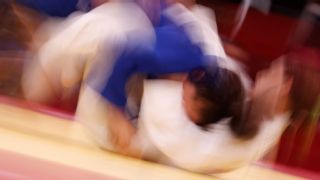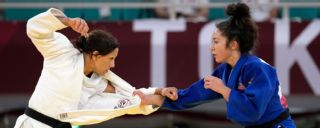|
TOKYO -- Years before Angelica Delgado would make Team USA in 52-kg judo at the Tokyo Olympics, she was sweating the first beads of her fighter's story in a backyard dojo. It was there, as young girl in the heat of Miami, where her father taught her how to to break a fall. And now, judo returns home. It is here, in Tokyo, that the sport made its Olympics debut in in 1964. For a judoka, competing in Japan is the sword in the stone. I can relate. Raised in a sport that seldom gets recognized -- except, of course, for the Austin Powers "judo chop" -- I recall explaining our family martial arts business to friends. I would earnestly dissect the elements of judo -- wrestling and jiu-jitsu -- often by inadvisably demonstrating impromptu moves on the most unsuitable surfaces. I'd share the tribulations that came with my father's Mr. Miyagi-like coaching at our small dojo in Connecticut. I'd drag friends to class, only to meet their dog-tired expressions after two hours of body-hardening falls and throws, a sign they likely weren't coming back. Olympics medal tracker | ScheduleCould I blame them? After all, very few understand the passion and plight of the judoka. Why would anyone don a canvas kimono that causes rug burns for the ages, then engage in an explosive, physical chess match, the kind that makes you shrug off cauliflower ear and delay a doctor's orders for knee surgery? Perhaps the challenge is what makes judo so attractive. Silly me. I thought others would see what I saw, what Angelica Delgado saw and fall in love with judo, too. Without a mainstream following in the United States, even an elite fighter like Delgado, who competed in her first Games in Rio, must fight both literally and figuratively for any spotlight or sponsorships. That's no surprise to the judo community, who are usually guilty of advertising a stereotypically modest version in the hopes outsiders will identify, like the way martial artists have been depicted since before the Karate Kid's Daniel LaRusso made "the crane" a thing. Delgado didn't come here for any of that. She came to win -- and she's not alone. Three Americans are with Delgado in Tokyo to compete for spots on the podium -- Colton Brown, Nefeli Papadakis and Nina Cutro Kelly. Don't know them? Well, you should. Though it may not have a stronghold in the United States, judo is arguably the most popular export of all Japanese Olympic athletics. Delgado enjoys its popularity here. "Everyone knows what an ippon is," she beams, judo's knockout point. "There's respect because they know what it takes to be a judoka."  This pursuit has been years in the making. She has been watching judo's Tokyo Grand Slam since grade school. While most kids were watching cartoons, Delgado was deep into judo. She admits this Olympics experience is not the same without the fans. And her biggest fan is thousands of miles away, where Miguel Delgado was cheering and rooting for his 30-year-old daughter as she competes at the legendary Nippon Budokan. For many athletes, the uncertainty of the pandemic and lockdown cut into precious training time. Delgado stayed optimistic. "I always knew we'd get here," she said. "I've been training all my life, since I was 8 years old. I wouldn't give up because of a few months." Delgado has been asked about the wait to get here. With one win and one loss in Tokyo, she didn't medal in these Olympics. Twenty-one years of training all came down to five minutes. After all the sacrifices, she has to weigh her love for the sport again. Was it all for nothing? In a recent letter to her father, she acknowledged the years he poured into her career. "I promise if I fall, I'll get right back up," she said, paying homage to her very first lesson, an 8-year-old girl break falling in the backyard who is now a two-time Olympian. Long before her performance on the world stage, I remember being defeated by Delgado in competition. That loss for me, as for most judoka, is all part of our charge to derive meaning from the struggle -- a pursuit not easily abandoned. So don't be surprised if you see her again. Sheila Pereira is an ESPN International Security leader, raised in judo since age 4 and is a formerly nationally ranked judoka. She is an Army combat veteran of the 101st Airborne Division.
|

